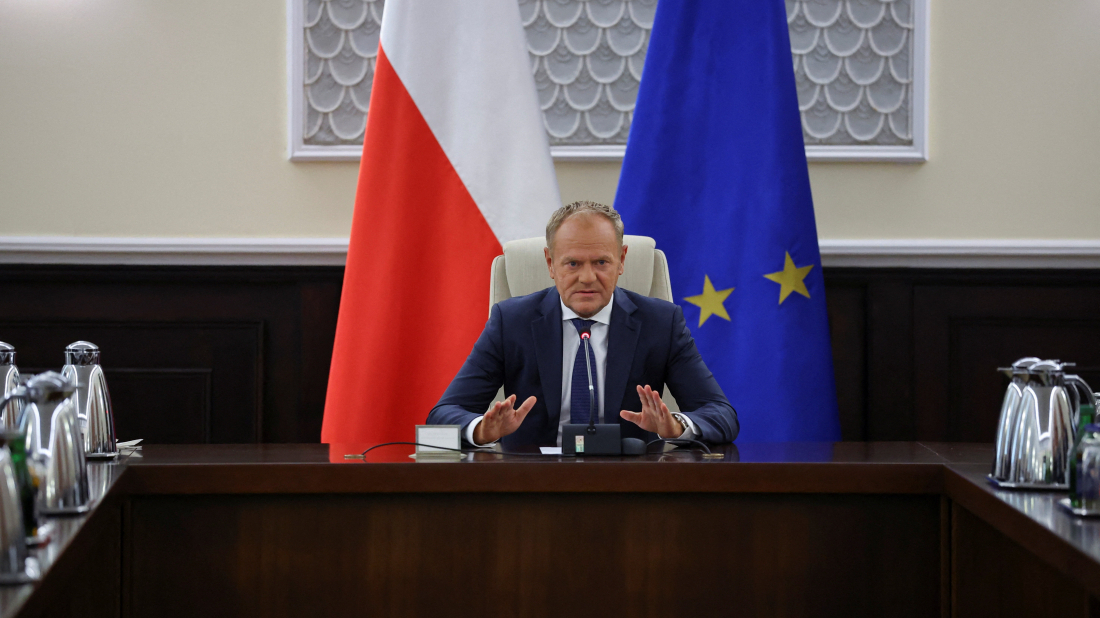Ukraine's Zelenskyy says ‘more readiness’ for next trilateral meeting, as Geneva talks conclude
U.S.-mediated talks on the Russia–Ukraine war concluded in Geneva on Thursday, with Ukrainian President Volodymyr Zelenskyy describing the outcome a...

On Wednesday, Poland shot down drones in its airspace, aided by military aircraft from NATO allies. This marked the first instance of a NATO member firing shots during Russia’s war in Ukraine.
Polish Prime Minister Donald Tusk addressed parliament, describing the incident as "the closest we have been to open conflict since World War Two." However, he emphasised that he did not believe the situation was approaching full-scale war.
Moscow denied any involvement, with a senior diplomat claiming the drones had come from Ukraine. European leaders, who have been trying to persuade U.S. President Donald Trump to join them in imposing tighter sanctions on Russia and increasing support for Kyiv, argued that the attack justified a collective response. No immediate reaction came from Washington.
Large-Scale Provocation: Poland's Response
Poland reported that 19 objects had entered its airspace during a large Russian air assault on Ukraine. The drones that posed a threat were shot down, and Tusk labelled the event a "large-scale provocation." He invoked NATO’s Article Four, which allows member states to demand consultations when they feel their security is threatened.
NATO confirmed that it was not treating the incident as an attack but as a deliberate incursion. Polish F-16 fighter jets, Dutch F-35s, Italian AWACS surveillance planes, and NATO-operated refuelling aircraft participated in the operation.
Russia Denies Involvement
Russia’s charge d’affaires in Poland, Andrey Ordash, rejected accusations of an incursion, calling them "groundless" and questioning the evidence provided by Poland. The Kremlin refrained from directly commenting on the downing of the drones but accused the EU and NATO of routinely accusing Russia without offering supporting evidence.
EU and NATO Leaders Call for Action
NATO’s Mark Rutte said that a full assessment of the incident was still pending but condemned the actions as "absolutely reckless" and "absolutely dangerous."
In response, European Union High Representative Josep Borrell stressed that Russia’s actions were escalating rather than subsiding. "We must raise the cost on Moscow, strengthen support for Ukraine, and invest in Europe’s defence," said Kaja Kallas, the EU’s top diplomat.
A Dangerous Precedent for Europe
Ukrainian President Volodymyr Zelenskyy described the drone attacks on Poland as "an extremely dangerous precedent for Europe" and called for a joint response from Ukraine, Poland, all European nations, and the United States.
Increasing Sanctions on Russia
European Commission President Ursula von der Leyen called for additional sanctions on Russia, particularly targeting the ‘shadow fleet’ that transports Russian oil and third countries purchasing it.
President Trump, who had previously met Putin in Alaska, indicated that he was ready to enter the second phase of sanctioning Russia following extended negotiations regarding a peace deal. This suggests a potential escalation of pressure on Moscow or its oil buyers in light of the ongoing war in Ukraine.
A New Phase in Western Sanctions
The European Union's top sanctions official has been in Washington this week to discuss coordinated actions. If implemented, this would mark the first time since Trump’s return to office that the U.S. and Europe would jointly target Russia.
The death toll from heavy rains and flooding in Brazil’s Minas Gerais state has risen to 46, authorities said, with 21 people still reported missing. The storms triggered landslides and widespread flooding, displacing thousands across Juiz de Fora and Uba.
The U.S. Embassy in Jerusalem says it will provide on-site passport and consular services to settlers based in the West Bank on Friday 27 February. The move marks the first time American consular officials have offered such services to settlers, U.S. officials said on Tuesday.
UK police have concluded searches at Andrew Mountbatten-Windsor’s former residence in Windsor Great Park as part of an investigation into alleged misconduct in public office.
The situation in Cuba was heating up and called for restraint following a deadly incident involving a Florida-registered speedboat off the coast of the Caribbean island, the Kremlin said on Thursday (26 February).
A group of sick and injured Palestinians and their caregivers left Gaza through the Rafah border crossing on Wednesday (25 February) for medical treatment abroad, as limited evacuations continue under tight restrictions.
China’s military said on Friday it had conducted a routine patrol in the South China Sea from 23 to 26 February, accusing the Philippines of “disrupting” regional peace and stability by organising joint patrols with countries outside the region.
Russian Foreign Ministry spokeswoman Maria Zakharova on Thursday (26 February) accused Ukraine of threatening Europe’s energy security by halting oil flows through the Druzhba oil pipeline to Hungary and Slovakia.
U.S.-mediated talks on the Russia–Ukraine war concluded in Geneva on Thursday, with Ukrainian President Volodymyr Zelenskyy describing the outcome as showing “more readiness” for further trilateral diplomacy covering security, economic and political elements of a potential settlement.In his nightly
Iran’s top diplomat said that the next round of nuclear talks is expected in less than a week after what he described as “progress in the most serious exchanges” between Tehran and Washington. The statement follows the third round of nuclear talks on Thursday (26 February) in Geneva.
Mexico’s President Claudia Sheinbaum on Thursday thanked FIFA and its President, Gianni Infantino, for reaffirming that the country’s 2026 World Cup host venues will remain unchanged, following violence that erupted after the killing of a major cartel leader.
You can download the AnewZ application from Play Store and the App Store.

What is your opinion on this topic?
Leave the first comment